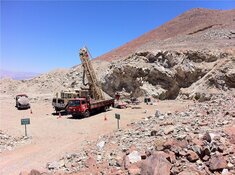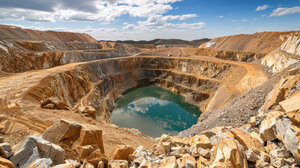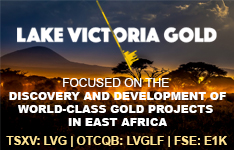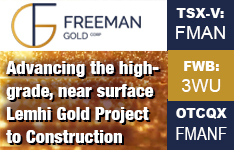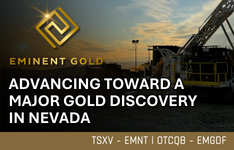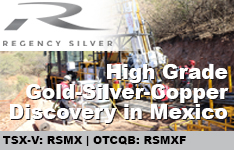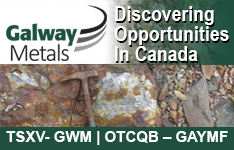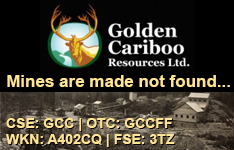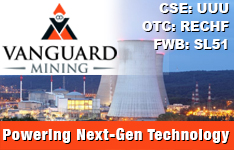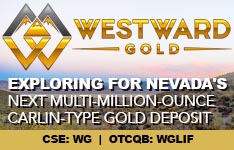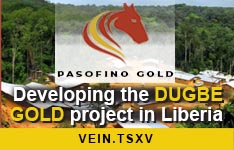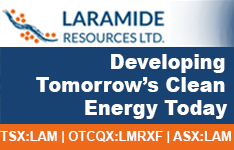Malcolm Gissen: Absolutely. We are concerned that such hostile environments in state capitals and in Washington D.C. have made it very difficult for Democrats and Republicans to work together for solutions that benefit all of us. It seems everything is about getting elected and re-elected instead of doing what's best for the country. We believe this factor will continue to drive up the price of gold and silver. The stalemate over the budget, both in various state houses, and in Washington, has so polarized our country that we believe it's having a detrimental impact on markets. All of this plays well into hard assets because when people are worried about their economies, inflation and their own lifestyles, they tend to invest in hard assets. And this is something we've taken advantage of with the Encompass Fund and our client accounts.
Marshall Berol: While Malcolm and I often agree on investment philosophies and style, we have somewhat differing views on political issues. But I certainly agree with him that party politics are negatively affecting the people and country and that it's one of a number of aspects driving up the gold price.
TGR: Gold recently climbed past $1,500/oz. Do you believe further upward momentum could be curtailed by the inevitable "sell in May and go away" sentiment?
MB: It could be, but the emphasis would be on "could." If so, it would be a short-term effect. We remain very positive about the upward trends for gold and silver on a longer-term basis and that's 6 months, 12 months and further out. There could be some correction over the next few months and it could be related to sell in May and go away, or it could be the summer doldrums. More likely there would be some profit taking due to the fact that gold is now over $1,500/oz.—a new all-time high and silver is roughly $48/oz. and also approaching a new all-time high.
Our experience in managing the Encompass Fund and individual client accounts over many, many years is that, when a concept or theory becomes well known, it often doesn't continue to work. Sell in May and go away is certainly in the forefront of people's thinking this year and probably the last couple of years. It very well could be that, because it is foremost in people's consciousness, it's not going to happen.
MG: We invest in a number of junior mining companies, including precious metals juniors. The companies the Encompass Fund invests in tend to be those making lots of progress. They're exploring, drilling, moving toward production and enhancing their value. There's a stream of good news that's coming out of these companies and that moves the stock price regardless, almost, of what's going on in the markets. As these companies make terrific progress, the Encompass Fund believes they will be rewarded in the marketplace. We don't invest more or less in gold companies based on the time of the year; the Encompass Fund invests in outstanding companies that we believe are making progress.
TGR: How much is your fund up so far this year?
MG: The fund is up about 3% this year. Morningstar puts the Encompass Fund in the World Stock Fund category and for one year, the category was up 14.17%. As of March 31, 2011, the fund was up 51.5%. It's very unusual for a fund to outperform its category by more than 1, 2 or 3 percentage points. So, to outperform by 36% is very unusual. Over three years (to March 31), the Encompass Fund has gained a 19.6%-per-year average annual return, compared to about 1% for the World Stock Fund category.
TGR: And to what do you attribute that?
MB: The fund is set up as a no-load mutual fund on a go-anywhere basis. We can invest in companies of any size. We can invest domestically or internationally, and we do; we can also invest in any industry or sector. While we've focused on gold and resource companies since we launched the fund in June 2006, we're not solely a resource or gold fund. We have holdings in other categories. We're stock investors—we don't use futures. It's the focus on the resource companies that has enabled the Encompass Fund to perform so well because the gold and silver stocks and rare earth elements (REE), copper, uranium, coal, gas and other commodities are doing very well.
MG: We have four people here who are involved in sourcing ideas, doing research and monitoring the positions in the fund. All of us have a minimum of 15 years' experience and a few of us have 25 years' experience. Over the last 10 years, we've formed relationships with brokerage firms doing business around the world. Those relationships not only provide us access to outstanding analysts and their best ideas, but it also brings us opportunities for private placements in companies on very attractive terms. These are companies that have very high growth potential; thus, we provide exposure to sectors and companies that very few, if any, other American mutual funds provide.
TGR: Indeed. As Marshall said, your fund is heavily weighted toward resource companies and particularly junior explorers seeking economic concentrations of hard assets like gold, silver, oil and gas or uranium. These small segments of the market are currently outperforming the broader market, but how long do you think that's going to continue?
MG: We live in unusual economic times, and we believe the explosive growth we're seeing in developing economies will likely continue for the next 10–20 years. This growth requires enormous amounts of resources whether they be energy, precious or other metals; and as a result, we believe that resource companies should perform very well over the longer term.
MB: Historically, the small caps have outperformed the large caps. We're investing for the long term and our experience has been that the smaller companies—the mid-cap, small-cap or micro-cap companies—are more likely to have that long-term growth than are large companies. A large company is more stable but it's less likely to have the kind of growth that we think can be obtained with smaller companies. Some examples would be Barrick Gold Corp. (TSX:ABX; NYSE:ABX) and Newmont Mining Corp. (NYSE:NEM). Those are fine companies but they're not going to grow their companies and, hence, the stock prices as quickly as many of the companies we have in the Encompass Fund portfolio. Having said that, we do have positions in some larger companies, such as Freeport-McMoRan Copper & Gold Inc. (NYSE:FCX), which we think is just an excellent copper and gold company. It's the world's largest publicly owned copper producer and also a large gold producer; very well managed. But we tend to lean toward the small-cap and micro-cap companies.
TGR: Could you tell us about a few of those companies? Let's start with some names in the gold and silver space.
MG: A gold company that we have invested in for about three years is Avion Gold Corp. (TSX:AVR; OTCQX:AVGCF). Initially, we invested at roughly $0.10 about three years ago. Avion has since become a gold producer in West Africa and is now trading at around $1.65.
TGR: Was that initial position part of a private placement?
MG: Yes it was, and then we bought more in the open market and got stock in warrants. In fact, we're exercising the warrants now because they expire in a couple of weeks. The warrants were at $0.65; so, we've had a very big gain. Avion's production was about 51,000 ounces (Koz.) in 2009 and around 87 Koz. in 2010. This year, it anticipates producing about 100 Koz. With gold at $1,500/oz., that's $150M in cash flow. Avion has very good grade in its mines in Mali. The company's doing further exploration and getting very good results. In addition, it has and is exploring properties in Burkina Faso, also in West Africa. The results look promising and the company expects to complete an NI 43-101-compliant resource estimate during the second quarter of this year.
TGR: Avion owns 80% of the Segala, Tabakoto and Dioulafoundou gold deposits in Mali. Those are currently open-pit operations, but Avion is going to head underground at some point, correct?
MG: That's correct. And we believe, with the grade it's getting and the exploration results, Avion should be expanding its resource. The 43-101 will be important because it will provide verification for what the company's doing. Many larger gold companies wait for junior miners to produce a 43-101 report before they start getting interested in the junior, in terms of a possible acquisition.
TGR: One thing raising some eyebrows with Avion is its cash costs per ounce. What are your thoughts on that?
MG: Avion's cash costs have been a bit high. The company has focused on reducing cash costs and expects that it will reduce them.
MB: It's also a function of increased production. Avion has increased production steadily and feels that it will continue increasing production, which should bring down the cash costs. Cash costs are certainly an important factor to look at; but regardless of whether you're looking at $450–$500, or even $550/oz. cash costs, with gold at $1,400–$1,500/oz., that's still a healthy margin for any company.
TGR: Have you met with Avion management?
MG: Yes. We should point out that we meet with the managers of almost all the companies in which we invest. We try to get very close to these companies, so we can call and talk to them on a regular basis and get updated on any developments. A good number of the CEOs of the companies in which Encompass invests call us regularly. I should point out this is not insider information, but we do like to keep abreast of the companies in which Encompass is invested.
MB: With a smaller company, we find that it's more valuable to have met and sized up management.
TGR: It's also a matter of reducing the risk because, if you meet and get a good sense of management, you go into that investment with a greater feeling of security.
MB: That's very true, and each of the four of us involved in portfolio decisions has a good amount of experience in meeting with companies. We feel it's very helpful in determining whether or not to invest in a company, or whether to sell some or an entire position in a company after we've invested. We also believe in doing site visits to the projects of the various companies in which we're invested or interested.. We find it's very helpful to meet not just top management, but also the people involved in exploring the project or running the mine.
TGR: What about some other silver and gold names that you like?
MG: Another company that we like is Extorre Gold Mines Ltd. (TSX:XG; NYSE.A:XG; Fkft:E1R;), which is a Canadian company that has some excellent projects in Argentina. It was spun off from Exeter Resource Corp. (TSX:XRC; NYSE.A:XRA; Fkft:EXB). What we like about Extorre is that its projects are near a lot of infrastructure—and those projects are extremely high-grade. The company recently announced some additional drill results from its flagship project, Cerro Morro, and the grade was very impressive. Also, the project should be easy to get into production—maybe even by the end of 2012. Of course, we like the management. Extorre's a very aggressive driller, which we also like and the drilling results have been incredibly attractive. Extorre has a lot going for it.
TGR: Cerro Morro is not far from Goldcorp Inc.'s (TSX:G; NYSE:GG) Cerro Negro gold-silver project in Argentina, which it bought from Andean Resources for $3.5B last year. Does that increase the odds of Extorre being a takeover target?
MG: Extorre certainly could be a takeover target and its management pointed that out when Andean was taken over by Goldcorp, including what it paid. However, Extorre Cochairman Yale Simpson recently said: "We are not selling; we have a lot further to go. We have a great resource and want to continue drilling, and we are not going to sell the company."
MB: Most companies have managements that portend to continue exploration—drilling, then on to an NI 43-101 report, then prefeasibility and feasibility studies, developing a mine and getting it into production. That happens, sometimes. But more often, another company comes along with an offer that's too good to refuse and the company either winds up selling the project or the company. That was the case with Andean. Depending on whose numbers you use, Andean was bought for $900–$1,100/oz. gold in the ground—but Goldcorp recently reported a doubling of the amount of reserves at that project.
We don't buy a company because we think it will be bought or because its project is going to be bought. That's the icing on the cake. The Encompass Fund isn't buying based on takeout rumors—it's buying based on good, solid projects and good, solid companies. If a buyout comes, and the Encompass Fund has had several buyouts over the course of its life, that's great and we're happy to get the additional premium that comes with the deal.
TGR: Extorre is trading in the $9–$10 range. How much did you pay for it?
MB: Several years ago, we bought Exeter; as a matter of fact, when we started Encompass Fund in June 2006, we bought Exeter and added to it over the succeeding years. Then in early 2009, Extorre was spun out of Exeter on a 1-for-1 stock basis. On the suggested tax-basis split of 80% of the original cost to Exeter and 20% of cost to Extorre, Encompass' cost was roughly $0.40 per XG share. Subsequently, we sold some Extorre when the Fund had a very substantial gain—and sold more when it continued to go up. After that, we bought additional shares because of the company's continued excellent drilling results. Extorre is making excellent progress. We continue to like it and buy it.
TGR: In addition to your success with gold and silver juniors, you've also had success with rare earth plays. What are some REE plays that you're excited about?
MB: Encompass Fund initially invested in Avalon Rare Metals Inc. (TSX:AVL; NYSE.A:AVL; OTCQX:AVARF) in September 2007 at $1.81 and has added to it since then. Avalon's current price is about $9/share. Another company that is involved with REEs, but with a very different business model, is Dacha Strategic Metals Inc. (TSX.V:DSM; OTCQX:DCHAF). Dacha is an investment company that is focused on the acquisition, storage and trading of strategic metals, primarily REEs. We think Dacha is very attractive and underappreciated in the marketplace.
As your readers are aware, 95% of the current REE supply comes from China, which has been enforcing export quotas. And the prices of the metals are rising due to industrial countries' increasing difficulty to source them. Dacha was set up a couple of years ago with the proper licenses to buy REEs in China, store them (primarily outside of China), and then sell and trade them to various customers. It's been doing this successfully for a couple of years now. Dacha's a low-priced stock—it currently has a net asset value (NAV) around CAD$0.68/share—but it's trading at about CAD$0.46/share. There are some concerns about whether the company can source the material coming out of China, warehouse it and sell it. But Dacha's been able to do that so far, and we think it will continue doing so, which is why the Fund owns it.
TGR: Could one of the other reasons that Dacha's share price is lagging its NAV be that its biggest customer base is in Japan? As we all know, Japan suffered a major earthquake and tsunami and a lot of its manufacturing has been affected.
MB: It's possible. I can't comment on if it's selling as robustly as it would like to, but it is selling. Some sales have been reported over the last several months. The situation in Japan is tragic and it's extremely unfortunate, but it's not going to affect Japanese manufacturing on a long-term basis; it's a shorter-term situation. Another aspect of Japan's earthquake and tsunami is the aftereffect on uranium stocks. We have since added to Encompass' positions in uranium stocks we already own and initiated some positions in other uranium producers because those stocks effectively went on sale.
TGR: Can you provide a few uranium names that you were able to get at lower prices given the onset of the nuclear problems in Japan?
MB: Yes, one of the larger holdings in the Encompass Fund portfolio is Uranium Energy Corp (NYSE.A:UEC). Before the Japanese disaster, it was selling at over $5/share and very briefly dipped down to $3/share. We added to our position at around $3.25–$3.40 per share. Another company that we liked and wanted to have a position in but at a better price is Ur-Energy Inc. (NYSE.A:URG; TSX:URE), which also went down 40%–45% in price. We initiated a position in URG and have since added to it. Another company I will mention quickly is Tournigan Energy Ltd. (TSX.V:TVC, FSE:TGP), which has a uranium project in Slovakia.
TGR: What do you think is the next milestone for gold? And will we reach it in 2011?
MB: The next milestone is further all-time highs. At the Encompass Fund, we've invested in certain gold companies and added various others for the last several years while people were saying things like, "It's a bubble," "It's a top" or "It's not going higher." We didn't believe that was the case, and we still don't think that's the case regardless of whether pundits gave it a $1,500/oz. price target. We're there and now they're talking about $1,600, $1,800 or $2,000/oz gold. We'll likely get to those amounts, we just don't know when. It is very difficult to put any specific price on it. So, at this point, we'll continue to stay tuned and invested. We're holding a larger amount of cash now than we often do—around 30%. And we're looking for opportunities to put that cash to work.
TGR: Thank you for talking with us today, gentlemen.
Malcolm Gissen founded Malcolm H. Gissen & Associates Inc., an investment advisory services firm, in 1985. He has been an investment advisor since 1985 and has managed separate accounts since 1999. Mr. Gissen's management experience has focused primarily on investments in publicly traded companies. Mr. Gissen has a BS degree from Case Western Reserve University and a JD from the University of Wisconsin.
Marshall Berol has been engaged as an investment manager in San Francisco, CA since 1982. Since 2000, he has been the chief investment officer of Malcolm H. Gissen & Associates, Inc. In addition, Mr. Berol has owned his own investment firm, BL/SH Financial for more than 20 years. His investment management experience has focused primarily on investments in publicly traded companies. Mr. Berol did his undergraduate work at the University of California (Berkeley) and received a JD from the University of San Francisco School of Law.
Mr. Gissen and Mr. Berol cofounded Encompass Fund, a no-load mutual fund, in June 2006 and are the Fund's coportfolio managers.
Want to read more exclusive Gold Report interviews like this? Sign up for our free e-newsletter, and you'll learn when new articles have been published. To see a list of recent interviews with industry analysts and commentators, visit our Expert Insights page.
DISCLOSURE:
1) Brian Sylvester of The Gold Report conducted this interview. He personally and/or his family own shares of the following companies mentioned in this interview: None.
2) The following companies mentioned in the interview are sponsors of The Gold Report or The Energy Report: Avion, Extorre, Exeter, Goldcorp, Dacha, Uranium Energy Corp. and Ur-Energy.
3) Malcolm Gissen: I personally and/or my family own shares of the following companies mentioned in this interview: Encompass Fund, Freeport-McMoRan, Avion, Extorre, Exeter, Dacha and Uranium Energy Corp. I personally and/or my family am paid by the following companies mentioned in this interview: None.
4) Marshall Berol: I personally and/or my family own shares of the following companies mentioned in this interview: Encompass Fund, Freeport-McMoRan, Avion, Extorre, Exeter, Dacha, Uranium Energy Corp. and Tournigan. I personally and/or my family am paid by the following companies mentioned in this interview: None.





